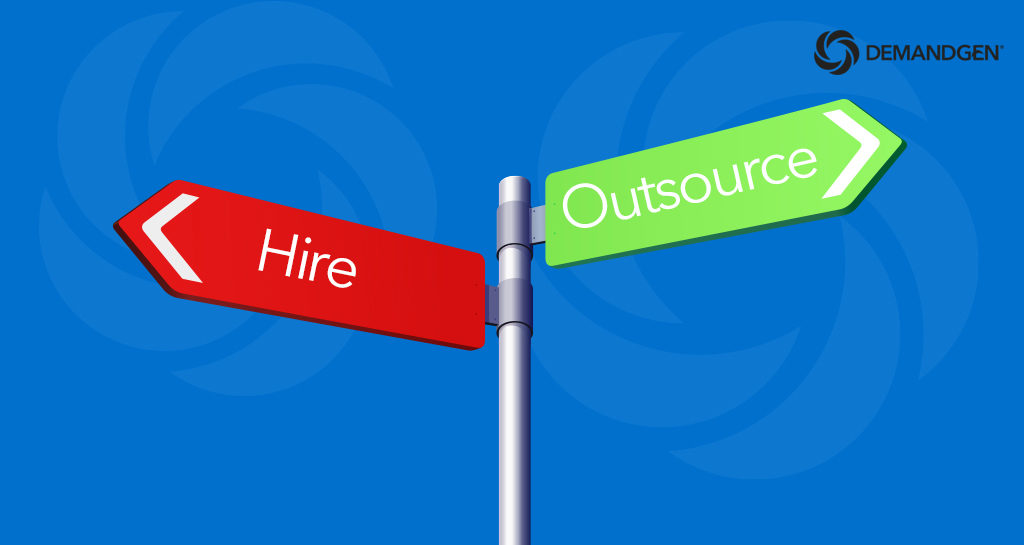
Most marketing teams are constantly inundated with neverending (and urgent) email campaign requests. Campaign specialists can feel like they’re playing a game of catch up they’ll never win, which can result in mistakes, low morale, and, ultimately, employee turnover. Sound familiar?
I’ve seen it first-hand in both large and small organizations. There’s often a point that many managers reach: Do I backfill or add another employee to pick up the slack, or do I look to a third party for help?
If you’re considering whether to hire or outsource the day-to-day tasks of building campaigns and getting them out the door, how can you be sure it’s right for your organization?
Over the past decade, businesses of all sizes across a diverse range of industries have already struggled with the decision to hire or outsource certain areas of responsibility, and there’s much to be learned from their hard-won wisdom.
One of the biggest lessons? Only outsource tasks that aren’t core to your business. This frees up your team to focus on more strategic priorities that truly add value — and building campaigns in a Marketing Automation platform is rarely considered a core function.
After that, your next biggest concern is most likely which decision will be most efficient and cost-effective. When considering the cost implications of hiring versus outsourcing, make sure you ask the following questions to get to the true total cost of each:
- How much does an employee actually cost?
We all know that the true cost of hiring and training a new employee is greater than just salary alone. Still, I find cost is the number one misconception when it comes to deciding whether to outsource campaign execution or keep it in house.
Comparing the annual cost of outsourcing to an employee’s annual salary can be misleading. If you only compare annual outsourcing costs to an employee’s salary, you’re leaving out many key investments you make in each of your employees on an ongoing basis, including benefits, payroll taxes, and more.
You’ll also need to account for any other benefits your organization offers, such as employee assistance programs, tuition reimbursement, subsidized health club memberships, and so on. Not to mention general business insurance expenses.
In fact, base salary is typically less than 35 percent of the total cost of a new employee. When you factor in recruiting, hiring, and training costs, the true cost of a new marketing employee making $70,000 per year comes out to over $150,000 in the first year of employment. That cost can be over $200,000 if you have to replace the employee:
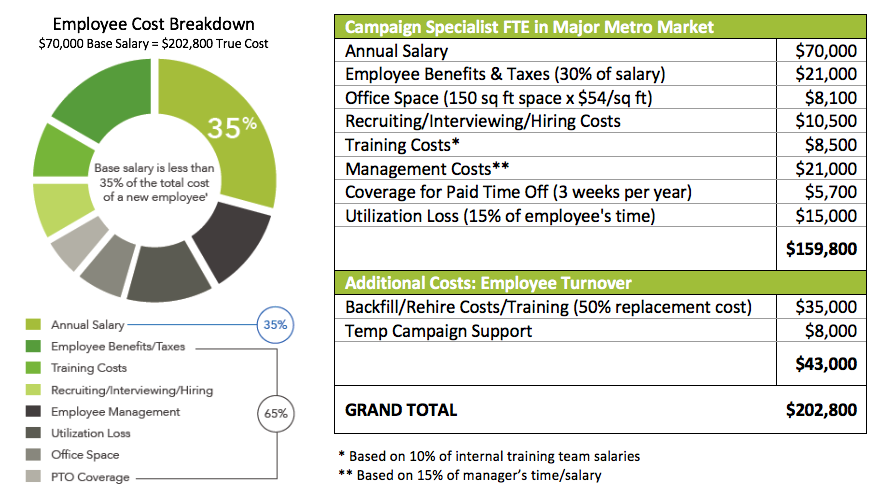
The true cost for new hires is even higher in major metro areas such as San Francisco (2.2 times higher) and New York City (2.7 times higher). Truly skilled individuals can be difficult to find. And when you do find them, they require additional investments in onboarding, training, and everything that goes along with being employed by your organization.
- What does employee turnover cost your company?
It’s an undeniable reality: roughly 40 percent of new hires quit within the first year. And a third of those quit within six months. Unfortunately, campaign operations roles have one of the highest turnover rates in marketing because of the high demand for that skillset. And when those team members leave, they take their knowledge with them.
Over my years heading up the Managed Services team here at DemandGen, I have seen plenty of cases where this is true. Many clients turn to us for help when their MarTech specialist leaves for another company.
Replacing an employee can cost between 50 to 60 percent of that employee’s salary, according to SHRM research, with overall costs ranging anywhere from 90 to 200 percent. And, it can take at least 6 to 8 weeks to recruit and hire a replacement, and 6 to 9 months or longer for a new employee to achieve full productivity — whereas ramping up an agency typically takes about 3 to 4 weeks.
There are additional impacts, such as reduced productivity, project delays, and lower employee morale (which is directly related to productivity). These can be a little more difficult to quantify, but Harris Interactive found the following in its research:
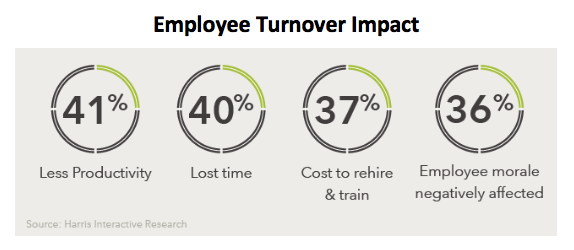
- Do you have enough work to keep a full-time employee busy (and time to manage them)?
If you’re deciding whether to outsource the day-to-day details of campaign execution or hire a full-time resource, don’t forget to factor in how much of their time will be spent actually working.
How much time in a day will a full-time employee spend on campaign development and execution — not counting meetings, administrative work, and downtime? Campaign volume tends to ebb and flow throughout the year. While they are waiting around for the next project, you continue to pay salary and full benefits.
And, someone has to manage them, which incurs costs of its own. Not to mention train them. When you outsource these tasks, you get the benefit of a managed and skilled team — managed and trained by someone else, that is. All you need to do is assign the work and shift your focus back to your core business activities.
When you take all of these additional benefits into account, organizations can reap tremendous cost efficiencies by outsourcing some or all of their campaign execution needs.
- Can one employee know it all and do it all?
Skilled staff are difficult to find and expensive, requiring constant training to keep up with the rapid pace of technology change (and when they’re training, they’re not working).
When you hire a full-time employee, you’re relying on a single individual to keep up not only with your campaign requirements, but also with best practices and the ever-changing features of the marketing technology deployed at your company. In addition, that employee is pulled in many different directions — distractions that take him or her away from getting work done. That’s a lot to ask of one person.
When you outsource your campaign execution to DemandGen, you never need to worry if your campaign specialists are up to date on the newest features and best practices. You can lean on the expertise of several subject matter experts to effectively and efficiently manage your campaigns, as well as benefit from the insights we’ve gained from working with hundreds of clients.
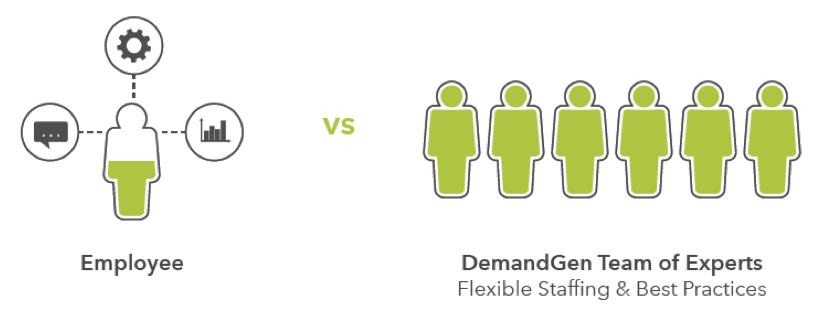
You also don’t need to worry about competing priorities or a lack of availability. The dedicated individual or individuals assigned to your business are there when you need them. We pride ourselves on coming through for our clients and meeting their deadlines.
- How much can you actually save by outsourcing?
So, how much can organizations actually save when they outsource campaign execution work? Going back to the example I shared above, the true cost of replacing an employee making a $70,000 base salary can actually translate to over $200,000 in total costs.
Since the average cost for outsourcing 1 FTE is $151,000 annually, that translates into a real savings of $52,000 in the first year alone:
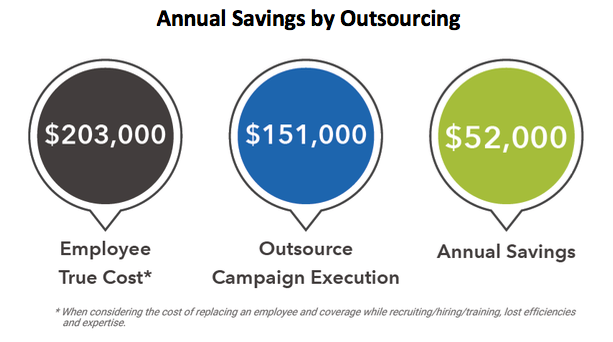
Of course, these numbers will vary based on your organization’s geographical location and salary range. By asking yourself the questions above, you can calculate a true cost comparison for your business.
Conclusion: When outsourcing makes the most sense
Many marketers think it will cost less to keep campaign execution in-house, but the reality is much different. When you take all costs into consideration, outsourcing is actually more affordable in the long run. Here’s a summary of the pros and cons:

Most marketing teams are stretched razor thin when it comes to getting campaigns out the door. That’s why DemandGen offers Campaign Execution Services. Outsourcing the administrative tasks of email development, testing, and execution frees up your folks for more strategic priorities.
As a flexible extension of your internal marketing staff, we have highly skilled, industry-certified marketing professionals who can assist with every part of the campaign development and execution process. Contact us to learn more about how our team can help you drive revenue for your organization.
 John Bokelmann leads the Managed Services team that supports DemandGen clients in digital marketing campaign development, production, and deployment. He provides strategic marketing operations leadership, develops and implements optimized workflow processes, and reinforces marketing best practices for both B2B and B2C clients.
John Bokelmann leads the Managed Services team that supports DemandGen clients in digital marketing campaign development, production, and deployment. He provides strategic marketing operations leadership, develops and implements optimized workflow processes, and reinforces marketing best practices for both B2B and B2C clients.
The post 5 Questions to Ask When Deciding Whether to Hire or Outsource Campaign Execution appeared first on DemandGen.
About the Author
























